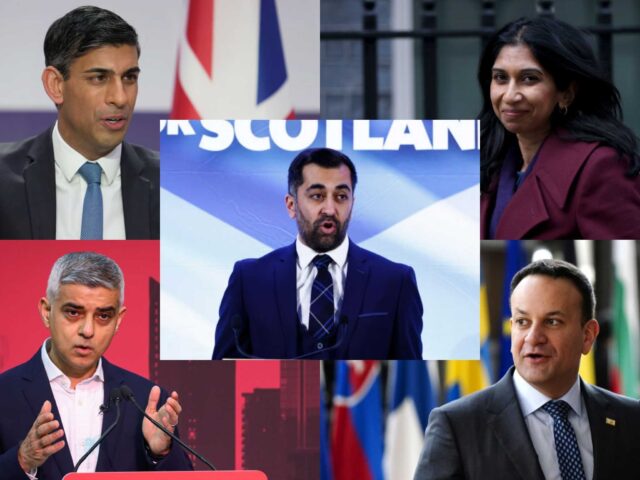Politicians of South Asian Heritage seem to be having a moment in the British Isles, with politicians claiming Indian and Pakistani history holding several of the most powerful political offices in the islands.
Humza Yousaf was elected the leader of Scotland’s ruling left-separatist Scottish National Party (SNP) on Monday, and on Wednesday will be sworn in as First Minister. In doing so, the Pakistani-heritage politician will join several other South Asians dominating the top of British politics, an impressive achievement in a country claimed by some to be stricken by considerable levels of institutional racism, and where by the latest count over 80 per cent of full-time residents are white.
As First Minister, Yousaf will lead Scotland’s devolved government — roughly equivalent to a U.S. State government — which is one of four constituent home nations in the United Kingdom. The Prime Minister of the whole United Kingdom, Rishi Sunak, also has South Asian heritage and was born in England to parents of Indian Punjabi heritage, a region on the India-Pakistan border.
Yousaf is the United Kingdom’s first national leader of the Muslim faith, while Sunak is the first of the Hindu faith. Meanwhile, administering home affairs for the Sunak government across the United Kingdom including policing and border control is Buddhist Suella Braverman, who like many Anglo-Indians has parents who came to the United Kingdom from India as a mobile administrative and middle class via the British Empire in Africa.
Braverman is only Britain’s second Indian-heritage Home Secretary, in fact. The senior ministerial position was recently held by fellow Conservative politician Priti Patel.
As well as the national Prime Minister, the Scottish First Minister, and the Home Secretary — one of the highest offices in the land — the Mayor of London, the capital and largest city, is also of South Asian heritage. Mayor Sadiq Khan was born in London to parents who came to the United Kingdom from Pakistan in the 1960s.
There does not appear to be a particular political flavour with these recent developments: Conservative party second-generation immigration politicians hold more power and positions than those from the left and hard left, despite the narrative from the left-leaning more heavily into race-based politics. The UK’s flagship Conservative newspaper The Daily Telegraph even took the occasion of Yousaf’s election this week as an opportunity to attack the left-wing Labour Party for not having elected a single female or non-white leader in its history, despite its rhetoric on the issue.
While the trend of successful members of a small ethnic minority enjoying considerable political influence is marked in the United Kingdom — where ‘Indian’ is one of the largest minority groups in the country, but still only accounts for three per cent of the population — it is seen elsewhere, too. The political state of the UK shares the geographical area of the British Isles with another state, the Irish Republic.
The Prime Minister of Ireland, Leo Varadkar, also has South Asian heritage, his father an Indian immigrant doctor.
While this political trend may seem surprising, especially given the overwhelmingly white demographics of the United Kingdom and the Republic of Ireland, it is unclear whether this moment is the crest of a wave that began in the last century with a small, elite clique of children of highly-motivated early migrants to Britain having come of age and into their political prime that will pass, or a longer-term trend.
Certainly, ‘Indian’ are now the ethnic group in the United Kingdom with the highest median income, pulling slightly ahead of ‘Chinese’ and White’ in government statistics and comfortably ahead of ‘Other Asian’. Paradoxically — perhaps — ‘Pakistani’ rates lowest among those sampled, with median incomes a full third lower than their ‘Indian’ neighbours from the Subcontinent.

COMMENTS
Please let us know if you're having issues with commenting.